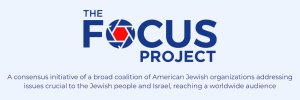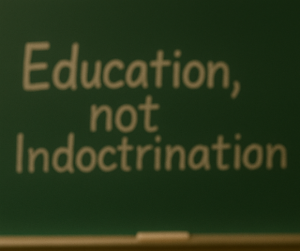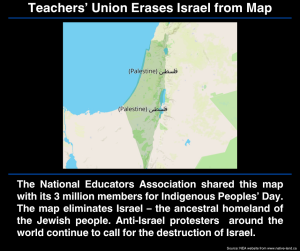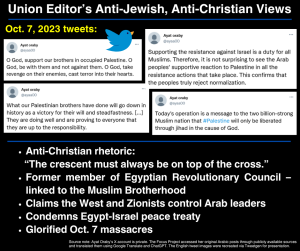
October 21, 2025
STAY INFORMED – TALKING POINTS – ACTIONS TO CONSIDER
![]()

Most teachers in America remain deeply committed to helping students think critically. The U.S. public education system has always been held to high standards and played an important role for generations of students. However, troubling examples from across the country show how anti-Jewish (antisemitic) and anti-American ideologies are creeping into classrooms. The efforts of parents, community leaders, educators and Jewish organizations have led to important progress – but more work is required to help ensure that our children continue to feel safe in their schools.
This is what makes a new California law so significant. Gov. Gavin Newsom recently signed Assembly Bill 715 – the first legislation in the country designed to prevent antisemitism in K-12 education. It represents a hard-earned success by Jewish organizations and allies who spent years pressing for reform – and a model for how states can begin to repair trust in public education. That progress reflects the values at the heart of American education – curiosity, inquiry and respect for multiple perspectives.
The California law is a meaningful development, but persistent issues remain. Distorted and politicized views of Israel and the Jewish people continue to appear in some classrooms. What began as fringe activism in university ethnic-studies departments has filtered into a number of K-12 classrooms through some teachers, politicized training programs and biased curricula.
Serious systemic problems demand vigilance and accountability. As a prime example, the National Education Association recently shared a map erasing Israel. Some union members and teachers have made antisemitic posts on social media and even praised Hamas.

Successful Pushback and Progress: California’s Case Study
California has become the nation’s testing ground for how schools confront antisemitism. The same state that once pioneered ethnic studies curricula that cast Israel as a “colonial oppressor” has now adopted a law combatting anti-Jewish hate in K-12 education. The measure creates the CA Office of Civil Rights and establishes an Antisemitism Prevention Coordinator to develop training, resources and enforcement guidance. It also requires districts to investigate and remediate discriminatory classroom or professional-development materials.
The Jewish Public Affairs Committee of California led advocacy for the legislation. JPAC Executive Director David Bocarsly explained: “There is a difference between discussing Gaza and allowing Jewish students to be targeted. Students have a right to an education free from harassment, and schools have a legal obligation to provide it.”
The measure passed with overwhelming bipartisan support – but even its champions acknowledge that the bill represents only a beginning. Much of the legislation’s early language was softened during negotiations, and its success will depend on how faithfully schools implement it. The California Teachers Association fought the bill, falsely warning that it could conflate criticism of Israel with antisemitism. JPAC leader Bocarsly reiterated that the bill “does not prevent criticism of Israel. Instead, it prevents environments that breed bullying, harassment and discrimination against Jewish students.”
Supporters view the law as a necessary floor, not a ceiling. Legislators from the Jewish, Black, Latino and Asian Pacific Islander caucuses co-sponsored the bill, signaling broad recognition that antisemitism undermines the safety of all minority students. More than 70 Jewish organizations and parent groups backed the effort, testifying that years of bias complaints had gone unanswered.
The real test will come in classrooms where school districts must interpret the legislative requirements. Activist educators are expected to seek loopholes or redefinitions of “fact-based teaching,” while Jewish families and allies will need to closely monitor enforcement. Advocates stated the new law provides important guidance, but its impact will depend on whether district officials, school principals and teachers agree that classrooms are intended for learning – not propaganda.

Teachers and Unions Spread Hate: ‘Filthy Jews’
The problem is not limited to individual classrooms – it often begins at the very top of the education establishment. The National Education Association – the largest teachers’ union in the U.S. – recently promoted Indigenous Peoples’ Day materials that erased Israel entirely from the map. The image labeled the territory – including the Jewish ancestral regions of Judea, Samaria and Jerusalem – as Palestine. Jewish organizations condemned the “antisemitic tropes and attempts to rationalize the atrocities of Oct. 7.”
When confronted, NEA leadership issued a statement claiming it “regretted the error” – reaffirming a generic commitment to combat “all forms of discrimination.” But the map itself was never corrected. The union also praised the partner organization that created it. What should have been a clear-cut apology became a case study in institutional avoidance – proof of how normalized anti-Israel bias has become in some professional educational spaces.
This incident is not isolated. In New Jersey, lawmakers demanded action after a magazine editor of NJ’s NEA chapter, Ayat Oraby, posted vile anti-Christian, anti-Jewish and pro-Hamas messages on social media to her more than 1 million followers:
Responding to requests for comments, the NJEA repeatedly stated that it does not comment on personnel matters. U.S. Rep. Josh Gottheimer: “The NJEA failed to act. Someone with a long record of vile anti-Jewish and anti-Christian posts should have no place in education in our state.”
In Philadelphia, a network of public school teachers marked the Oct. 7 anniversary with a “Rally for Rage and Resistance” that rejected peace. Organizer and local teacher Keziah Ridgeway boasted about teaching Palestine to her students. Last year, the high school social studies teacher reportedly threatened the parents of Jewish students. These examples demonstrate that when the organizations that train and represent teachers adopt or tolerate such narratives, they legitimize bias.
Other teachers’ unions as well as many educators have taken a strong stand against antisemitism and the NEA’s actions.

Curriculum and Classroom Content
Across the country, anti-Jewish and anti-Israel bias has appeared in some lesson plans, library book lists and teacher-training programs – portraying Jews as oppressors and Israel as a colonial occupier in its own ancient homeland. The shift began years ago in university ethnic studies programs and trickled down into K-12 classrooms through Liberated Ethnic Studies and decolonization curricula.
For many families, the impact is deeply personal. California mother Elana Cohen testified that her eighth-grade son came home asking why “Jews stole Palestinian land” after a social-studies unit on “colonization.” Incidents like these are not isolated.
Certain lesson materials and “Teach Palestine” toolkits present one-sided narratives as fact, glorify “resistance” – violence against Israelis – omit Jewish history and equate Zionism with racism. In some social studies classes, history units erase centuries of the Jewish connection to the Land of Israel and warping Jewish ancestry into a story of “settler colonialism.” The deeper concern is not one book or one teacher, but a broader effort to normalize anti-Jewish narratives in the next generation’s education.
Community Pushback: Litigation and Legislation
If anti-Jewish bias has become institutionalized in education, so too has the Jewish community’s determination to confront it. Grassroots parents, civil rights attorneys and community advocates increasingly are using the tools of law and public policy to push back against schools and unions that have crossed the line from instruction to indoctrination.
Lawsuits are testing the limits of school liability for antisemitic harassment and biased instruction. The Louis D. Brandeis Center for Human Rights Under Law and The Deborah Project have filed cases against districts that included anti-Israel content in classroom materials. Their attorneys argued that this instruction creates a hostile environment for Jewish students.
Pressure is mounting in Congress. Recently, the House Subcommittee on Education held a landmark hearing on antisemitism in K-12 schools, where witnesses described the growing fear among Jewish students and the failures of administrators to respond. The Brandeis Center’s Rachel Lerman: “Santa Ana school district officials agreed that it would be a good idea to hold sessions on Passover so that the Jewish members wouldn’t attend.” Lawmakers from both parties expressed alarm that anti-Jewish rhetoric is becoming normalized in too many communities.
At the state level, legislatures are beginning to respond. Massachusetts released the findings of its Special Commission on Combating Antisemitism. The report documented pervasive antisemitism in K-12 schools: students targeted Jewish students with graffiti and mocked them with Holocaust jokes – leading many to hide their Jewish identity. Many reported feeling unsafe simply acknowledging they were Jewish. Zionist was recognized as a “replacement slur” for discriminating against Jews.
![]()

![]()

Every community can take steps to make classrooms safer and more inclusive for all students – including Jews.
Document every step and also reach out to respected Jewish advocacy and legal organizations – such as the ADL, Brandeis Center, StandWithUs, The Lawfare Project or the K-12 Antisemitism Legal Line – for guidance and legal support.
![]()
Stay Informed | Speak Up | Take Action
Want to Read More of Our Talking Points? Did you miss a recent edition of The Focus Project? No need to search your inbox. Our most recently published editions are available on our website.
![]()

This content is developed by The Focus Project in partnership with MERCAZ USA. The Focus Project distributes weekly news and talking points on timely issues concerning Israel and the Jewish people, including antisemitism, anti-Zionism and the delegitimization of Israel. It represents a consensus view across a spectrum of major American Jewish organizations. MERCAZ USA recognizes and respects the diversity of views on these issues among its readers and the community at large.